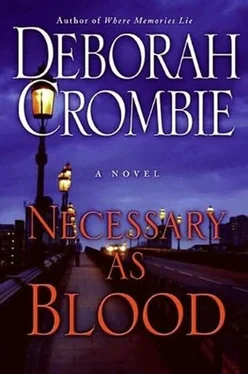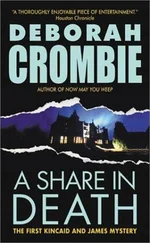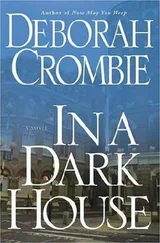“I’m not sure, to tell you the truth,” Hazel said haltingly. “I think I might be.”
Gemma stared at her, baffled. “We need to talk.” Looking up and down the street, she saw rows of cars baking in the still-brittle evening light, but nowhere to sit. “Let’s go back to the house. Or we can get something to drink at Otto’s.”
“No, I-Not yet.” Hazel swayed a bit. “My knees feel a bit like jelly, all of a sudden.”
Gemma thought for a moment, then linked her arm through Hazel’s. “Let’s just walk for a bit. I have an idea.” She guided them round the corner into Portobello Road and turned north. Their steps fell into a rhythm, and after a few minutes she felt some strength return to Hazel’s stride. At Tavistock Road, the trees provided welcome shade, but Gemma led them on, under the cavernous shadow of the Westway.
“We’ll get some juice,” she said, leading Hazel into a natural foods store, one of the small shops built under the motorway.
Gemma bought them both plastic bottles of mango-orange juice and thanked the proprietor. Then she led Hazel out the far side of the underpass and into the rectangular green of Cambridge Gardens.
The small garden looked deserted without the jumble of its Saturday market stalls, but farther down the parallel arcade, kids were taking advantage of the empty pavement to skateboard. The hum of the overhead traffic meshed with the whoosh of the boards’ wheels in a comforting symphony of white noise. Gemma picked the bench that seemed to have the least accumulation of pigeon droppings and sat, pulling Hazel down beside her.
She popped the top off the juice bottle and sipped, then turned to face her friend and said, “Tell me.”
Hazel drank, then closed her eyes and wiped the back of her hand across her mouth. “It’s good. So mango-y. I never realized that mangoes don’t taste like anything else.”
“Hazel-”
“I know-It’s-It’s just that I don’t know how to explain-talking about how I felt-how I feel-seems horribly self-indulgent now. I’ve done enough damage thinking about me as it is.”
“Don’t go all therapist on me. Just tell me what happened,” said Gemma patiently. “Start with the phone. Why did you turn it off?”
Hazel shook her head. “I-You’re going to think-” She saw Gemma’s fierce expression and went on hurriedly. “All right, all right. It was Sunday. After I got ho-back to the bungalow, from Islington. I was so angry. At you, at Tim, at myself.”
“At me?” said Gemma, surprised.
Hazel gave a small smile. “You didn’t want me there on Saturday night, at the house in Fournier Street.”
She hadn’t, Gemma remembered with a flush of guilt. “But, Hazel, I didn’t know what had happened. I had to-”
“Oh, I know you had good reasons, professional reasons. But the truth was that you could have worked round them if you’d had the mind. I was being a bitch and you didn’t want me there. And I knew it.” When Gemma started to protest again, Hazel touched her arm. “No, let me finish. I knew it, but I couldn’t seem to stop myself. I was jealous of that family, those poor people. And Sunday, even when I knew he was dead-Tim’s friend-it just got worse. I felt like-oh, I don’t know-like I was sinking under a weight of black oil, suffocating in it.
“And then, when I got home, and I realized I had done nothing to comfort that little girl…and that I had been so mired in my own nasty, seeping bitterness that I hadn’t even cared for my own child’s feelings…I-” Hazel stopped, drinking a little more juice and watching the skateboarders, and Gemma waited.
After a few minutes, Hazel went on. “That was when I turned off the phone. I couldn’t bear the thought of talking to anyone. I couldn’t explain myself. I sat for a long time, in the dark. And it began to seem as if it might be better for everyone if I just…disappeared. Like Sandra Gilles. I wanted to just step into the street and vanish. I wanted to find some way-”
Gemma felt cold. “Hazel, I-I should have realized. I should never have let you-”
“It’s all right.” Hazel took Gemma’s hand and squeezed it. “I don’t think you could have helped me. You’re too close to me, to everything that’s happened.”
Gemma shook her head. “No, I should have called you-I should have checked-”
“No. Listen. It wouldn’t have helped. What I needed was the kindness of strangers.”
“What?” said Gemma, not making sense of that at all.
Seeing Gemma’s look of bewilderment, Hazel gave a shaky laugh. “My neighbor ministered to me, with vegetable rice and dahl. You remember two of the boys you met? They’re brothers. Tariq and Jamil. They live in the council flats at the end of the road. I told you they look out for me. They saw me come home, for the second night, and sit in the dark-they can see the bungalow from their bedroom windows. They told their mother they were worried. She worried, too, and after a bit she came with the food she had made, and knocked on my gate. She’s very shy and she doesn’t speak much English, but she kept knocking until I answered.
“When she saw me, she put her arm round me and led me inside. She turned on the lights, and fed me, and ran me a bath. Then she sat up all night in the chair in my sitting room while I slept.” Now tears ran down Hazel’s cheeks, unchecked. “And when I woke up yesterday morning, I knew I couldn’t betray her care. So I have been trying to put myself back together, to think things through, to begin to make amends for the person I’ve let myself become. And I wanted to start with Charlotte…Somehow my…callousness…seemed the ultimate failure. Do you see?”
Gemma fumbled in her bag for a packet of tissues, remembering her own shock at Hazel’s behavior, trying to work out what to say. “I think I do understand. But, Hazel, nothing you’ve done is irredeemable. You’re just human, and humans make mistakes. The important thing is to remember that Tim and Holly love you-we all love you. Don’t shut us out. Don’t shut me out.” She handed Hazel a tissue and waited while Hazel blew her nose. “I’m your best friend, and if I haven’t made a very good job of it, I’m going to do better.
“Now,” she said with decision as she zipped her bag, “you’re going to ring Tim, and then you’re coming back to the house with me. Wesley’s made cake for Charlotte, but he promised to leave us a bit.”
“Oh, Gemma,” Hazel said, accepting the hand Gemma held out for a boost up. “You should have seen Wes with Charlotte. She followed him around like a little duckling. Do you think he’ll be allowed to visit once she goes to her grandmother?”
“What?” Gemma stared at her, frowning. “What are you talking about? What do you mean ‘once she goes to her grandmother’?”
“Didn’t the social worker call you?”
Gemma fought a rising flood of panic. “There must be a mistake. I talked to her earlier this afternoon. Sandra’s sister had petitioned for custody, but Mrs. Silverman said she has a record of neglecting her own kids, so that’s out. There was nothing about the grandmother. When they contacted her on Sunday, she said she didn’t want Charlotte.”
“Um.” Hazel looked at Gemma a little warily. “Mrs. Silverman rang Betty while I was there. It seems as though Sandra’s mother has changed her mind.”
Spitalfields had been London’s main Huguenot district and later a Jewish neighborhood. Close to the port, it and neighboring Whitechapel were first stops for many aspiring immigrants. In the sixteenth and seventeenth centuries Bethnal Green was a haven and staging-post for Huguenot refugees escaping from persecution in France, who made an enormous contribution to the architectural, economic and demographic history of East London…
Читать дальше












